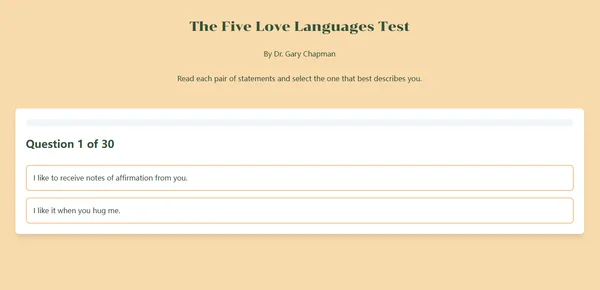Can Your Love Language Change? Exploring Needs Evolution
June 15, 2025 | By Hannah Carter
We often think of our love language as a core part of who we are, a relatively stable preference for how we give and receive affection. But as life unfolds, bringing new experiences, challenges, and growth, a compelling question arises: can love language change over time? This exploration delves into the fascinating concept of love language evolution, examining the factors that might influence shifts in our emotional needs. If you've ever felt your preferences subtly altering, or wondered about the changing love language of a partner, this article is for you. Curious about your current profile? You can always re-evaluate with our love language test.
Understanding the Foundation: Are Love Languages Fixed or Fluid?
The concept of the 5 Love Languages, popularized by Dr. Gary Chapman, provides a valuable framework for understanding relational needs. But are love languages permanent? The answer is nuanced.

Core Preferences vs. Learned Behaviors
It's believed that our primary love language is often shaped by early life experiences and our innate personality. This forms a foundational preference. However, this doesn't mean our ways of expressing or appreciating love are set in stone. We can learn to "speak" other languages, and our receptivity to them might also evolve. This involves understanding our emotional development.
The Stability Debate: What Experts Suggest
While some suggest a core love language remains fairly consistent, many relationship experts and psychologists acknowledge that preferences can shift or broaden. Life's dynamism means our relationship needs are not static. Significant life events or changes in relationship dynamics can certainly influence how we perceive and prioritize different expressions of love.
Early Influences and Later Life Adaptations
Your upbringing might have emphasized one language (e.g., Acts of Service if your family showed love through doing things). Later in life, through different relationships or personal growth, you might develop a deeper appreciation for another, like Words of Affirmation, especially if that was previously lacking. This reflects a needs evolution.
Factors That Might Influence a Change in Your Love Language
Several factors can contribute to the evolution of love languages. What causes love languages to change? Let's explore some key influencers:

Impact of Major Life Stages (Marriage, Parenthood, New Career)
Different love language life stages can bring about significant shifts.
- New Relationships/Marriage: In the early "honeymoon" phase, all languages might feel heightened. As the relationship matures, a deeper understanding of specific needs might emerge or shift.
- Parenthood: The arrival of children often dramatically changes a couple's dynamic. A partner who once thrived on Quality Time might now find Acts of Service (like help with the baby) incredibly loving.
- Career Changes/Retirement: Significant shifts in daily routines, stress levels, or available time can alter what feels most supportive and loving. These life transitions are pivotal.
Evolving Relationship Dynamics and Experiences
The health and nature of your current relationship can play a huge role.
- Positive Growth: A partner who consistently speaks a "new" language to you might help you develop an appreciation for it.
- Negative Experiences: If your primary love language has been consistently ignored or even used negatively (e.g., Physical Touch used in an unwelcome way), you might become less receptive to it and more open to others. Understanding interpersonal dynamics is key here.
The Role of Personal Growth and Self-Awareness
As we mature and engage in personal development, our understanding of ourselves and our needs deepens. Therapy, self-reflection, or even reading articles like this one can lead to new insights and a conscious desire to explore or prioritize different ways of connecting. This journey of self-discovery is ongoing.
How Unmet Needs Can Reshape Preferences
If a primary love language has been chronically unmet for a long period, an individual might adapt by becoming more receptive to, or even prioritizing, other languages that are being offered. This isn't always a conscious choice but can be a form of emotional adaptation.
Conscious Adaptation: Learning to Value New Languages
Sometimes, individuals or couples make a conscious effort to develop and appreciate languages that don't come as naturally, especially if they recognize its importance to their partner. This reflects relationship effort and a willingness to grow together. Want to understand your partner's current needs? Encourage them to take the love language quiz.
Real Stories: Examples of Love Language Evolution (Illustrative)
While individual experiences vary, consider these common scenarios:
- From Quality Time to Acts of Service After Having Kids: A couple who previously cherished long, uninterrupted conversations (Quality Time) might find that, with young children, a partner taking over childcare to give the other a break (Acts of Service) feels like the ultimate expression of love.
- Developing an Appreciation for Words of Affirmation in a New Relationship: Someone who grew up in a household where praise was scarce might initially not prioritize Words of Affirmation. However, in a relationship with a partner who naturally offers genuine verbal support, they might discover a deep, previously untapped need for it. These stories reflect how love language shifts can occur.
Recognizing Signs Your Love Language (or Your Partner's) Might Be Changing
How can you tell if a changing love language is underway? What are the signs of a love language changing?

- Old Expressions Losing Their Spark: Things that used to make you feel deeply loved now feel just "nice" or don't have the same emotional impact.
- New Ways of Receiving Love Feel More Impactful: You find yourself unusually touched or moved by expressions of love that previously weren't high on your list.
- Shifts in What You Complain About or Desire Most: Your "if only they would..." statements might start to center around a different kind of loving behavior.
- Increased Misunderstandings or Feeling Unseen: You or your partner might feel like your efforts to show love are suddenly missing the mark more often. Paying attention to these emotional signals is important.
The Importance of Re-evaluating Your Love Language Periodically
Given that love language evolution is possible, periodic re-evaluation can be incredibly beneficial for maintaining healthy and fulfilling relationships. Why should you re-evaluate your love language?

Why Self-Reflection is Key During Transitions
During major life transitions or if you notice the signs mentioned above, take time for self-reflection. Ask yourself what truly makes you feel loved and supported now.
Keeping Communication Open with Your Partner
Talk to your partner about your emotional needs and any perceived shifts. Open relationship communication is vital for navigating these changes together. Encourage them to reflect on their own needs too.
When to Consider Retaking a Love Language Test
If you suspect your primary love language has changed, or even if you're just curious after a significant life event, retaking a love language test can provide valuable clarity. It offers an objective snapshot of your current preferences.
Embracing Growth: Your Love Language Journey is Unique
So, can your love language change? The evidence suggests that while core tendencies might have deep roots, our preferences for expressing and receiving love can indeed evolve with our experiences, personal growth, and changing relationship dynamics. Your emotional journey is unique, and your love language is a part of that evolving landscape.

Embracing this potential for change allows for greater flexibility, deeper understanding, and more attuned connections in your relationships. Being open to re-evaluating your needs and communicating them effectively is a sign of relational maturity. If you feel your needs might have shifted, or want to understand your current profile with fresh eyes, re-discover your love language with our free test.
Have you ever felt your love language change? What do you think caused it? Share your experiences in the comments below!
Love Language Changes: Your Questions Answered
Here are some frequently asked questions about the possibility of your love language changing:
How often should I retake a love language test?
There's no hard and fast rule, but it's wise to consider retaking a love language test during or after major life stages (like getting married, having children, a significant career change, or experiencing loss), or if you feel a persistent disconnect in how you and your partner express or receive love. Perhaps annually or bi-annually during stable periods could also offer insights.
If my love language changes, does it mean my old one was wrong?
Not at all. A changing love language doesn't invalidate your past preferences. It simply reflects your growth and the evolution of your emotional needs in response to new circumstances or self-understanding. Your "old" language was right for you at that time.
Can my partner's love language change even if mine doesn't?
Yes, absolutely. Each individual's journey is unique. Your partner might experience shifts due to their own life events or personal growth, even if your preferences remain relatively stable. Open communication and a willingness to understand their current love language using a tool like our quiz are key.
What's more common: love languages staying the same or changing?
It's difficult to quantify definitively. Many people report a stable primary love language throughout much of their adult life, but also acknowledge an increased appreciation for, or a shift in the ranking of, other languages over time, especially in response to relationship needs and different life phases.
If my needs change, how do I communicate this to my partner?
Choose a calm, non-blaming time to talk. Explain what you've noticed about your own feelings and what now makes you feel most loved. Frame it as a discovery about yourself and an invitation for them to understand you better, rather than a criticism of their past efforts. Sharing insights from a recent love language assessment can be a helpful, neutral starting point.